|
|
|
Sort Order |
|
|
|
Items / Page
|
|
|
|
|
|
|
| Srl | Item |
| 1 |
ID:
113173
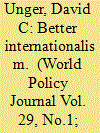

|
|
|
|
|
| Publication |
2012.
|
| Summary/Abstract |
Genoa-Internationalism has many different meanings, but constructive global citizenship should always be at its core. An internationalist foreign policy for the developed countries would use their wealth, economic might, and military power to promote a better, more peaceful, more prosperous world for everyone.
|
|
|
|
|
|
|
|
|
|
|
|
|
|
|
|
| 2 |
ID:
165780
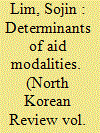

|
|
|
| 3 |
ID:
192745


|
|
|
|
|
| Summary/Abstract |
This study innovatively divided consumption-based CO2 emissions of developed countries into domestic and foreign components using an environmentally extended multi-regional input–output model, and revealed their different driving factors using the structural decomposition analysis method. The results showed that the consumption-based emission peaked in 16 developed countries, with 14 countries peaking around 2008. Domestic emissions in all 16 developed countries had peaked, most of which accounted for 40–70% of the total consumption-based emissions. However, the foreign emissions driven by 9 peaking countries still kept increasing. Regarding domestic emissions, the decline of domestic carbon intensity was the main driving factor across 16 peaking countries. In terms of foreign emissions, carbon intensity decline, especially in main medium- and low-income countries, was the dominant factor in the CO2 emissions decrease. Significant improvements in production technology levels of medium-income countries played a key role in weakening the carbon-increasing effects of foreign emissions during the post-peak period. Thus, to further promote global carbon emissions to peak as soon as possible, peaking developed countries should provide more emission reduction funds and technologies to support the decline in carbon intensity and the improvement of production technology in medium- and low-income countries.
|
|
|
|
|
|
|
|
|
|
|
|
|
|
|
|
| 4 |
ID:
173297
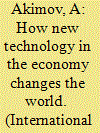

|
|
|
|
|
| Summary/Abstract |
THE PRODUCTIVE FORCES of any society come together in a trio of components: natural resources, human labor and capital (or tools of labor), and technology. The significance of these three components underwent radical changes with the onset of the industrial revolution of the 18th century, and the development of machine production dramatically increased the role of capital and technology in the economic production cycle.
|
|
|
|
|
|
|
|
|
|
|
|
|
|
|
|
| 5 |
ID:
079984


|
|
|
| 6 |
ID:
091079


|
|
|
|
|
| Publication |
2009.
|
| Summary/Abstract |
Why are some countries able to defend their currencies when there are speculative attacks, while others fail to do so and devalue their currencies? This article suggests that intragovernment factors as well as government-legislature relations should be considered because many of the policy responses to speculative attacks do not require legislative acquiescence, so that intragovernment attributes will have more substantial effects on the policy responses than those of government-legislature relations. This article suggests that cleavages within government and its instability have a negative effect on decisiveness. Data regarding speculative attacks in developed countries from the 1970s to the 1990s and the Heckman selection model show that governments with many veto players and with less durability have had difficulty in defending their currencies in the face of speculative attacks. The article also finds that governmental institutional effects can be constrained by central bank independence. The effects become substantially smaller and statistically insignificant when central banks are very independent. The overall results imply that policy indecisiveness induced by some political factors makes governments less able to adopt a new policy equilibrium that is necessary to respond to an exogenous shock such as speculative attack.
|
|
|
|
|
|
|
|
|
|
|
|
|
|
|
|
| 7 |
ID:
106641
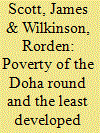

|
|
|
|
|
| Publication |
2011.
|
| Summary/Abstract |
Two distinct literatures have emerged on the World Trade Organization's Doha Development Agenda (DDA) and its likely benefits for developing countries. One is built on the use of computable general and partial equilibrium simulations, while another explores the political economy of the negotiation process to explore the opportunities a concluded round will bring for developing countries. Both literatures generate important insights into the DDA, and both highlight that the deal on offer to developing countries is very weak. However, there has been little engagement between these two bodies of thought. This paper seeks to begin to redress this, fusing a review of the simulations of likely DDA gains with an examination of the passage of the Doha negotiations. It argues that through this process we can arrive at a fuller understanding of how limited, and problematic, the results of the DDA are likely to be for the less developed countries. If the DDA is to deliver on its mandate, a qualitative shift in the negotiations is required.
|
|
|
|
|
|
|
|
|
|
|
|
|
|
|
|
| 8 |
ID:
108653
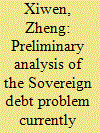

|
|
|
| 9 |
ID:
043310


|
|
|
|
|
| Edition |
2nd edition
|
| Publication |
DelhI, Vikas Publishing House Pvt. Ltd., 1972.
|
| Description |
208p.
|
|
|
|
|
|
|
|
|
|
|
|
Copies: C:1/I:0,R:0,Q:0
Circulation
| Accession# | Call# | Current Location | Status | Policy | Location |
| 011367 | 336.0091724/PRE 011367 | Main | On Shelf | General | |
|
|
|
|
| 10 |
ID:
140010


|
|
|
|
|
| Summary/Abstract |
This article provides an empirical analysis of the relationship between research and development (R&D) expenditures and economic growth, and determines whether this relationship differs with respect to the degree of development. In this regard, the study utilises data from 52 countries from 1996 to 2010 and employs a dynamic panel data model. The research finds that R&D expenditure has a positive and significant effect on economic growth for all countries in the long run, which is consistent with the relevant literature. For developing countries, the effect is weak in the short run but strong in the long run, as expected. The study adds new empirical evidence to the literature.
|
|
|
|
|
|
|
|
|
|
|
|
|
|
|
|
| 11 |
ID:
130225
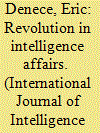

|
|
|
|
|
| Publication |
2014.
|
| Summary/Abstract |
That a "Revolution in Military Affairs" (RMA) took place in the early 1990s is widely known. The concept was born of technological, political, social, and economic changes that were to fundamentally alter the future of warfare, introducing a completely new type of military and organizational structure for the effective projection of force.
Though most experts accepted the reality of a fundamental transformation in the practice of warfare, few saw that a parallel revolution was occurring in the intelligence world, even though this specific field of national security was undergoing similar challenges and change.
That a "Revolution in Intelligence Affairs" in the 1990s and early 2000s actually occurred and its effects has become increasingly evident. This "intelligence revolution" resulted from a combination of changes in international politics, information technologies, and socio-political context.
|
|
|
|
|
|
|
|
|
|
|
|
|
|
|
|
| 12 |
ID:
130298


|
|
|
|
|
| Publication |
2014.
|
| Summary/Abstract |
With more than half of the world's population urbanized and two thirds of urbanites in developing countries, populations are moving away from agriculture-based livelihoods. However, people still must eat. This paper provides case study analyses of food security policies and programs in three cities at varying levels of development- Addis Ababa, Bogota and New York city- and examine the food security issues faces by these changing urban populations, and how policies in these cities have addressed these concern. It will explore the efficacy of policies and food security interventions by analyzing government and international community capacities as food production, distribution, and consumption change along with the processes of urbanization in both the developing and developed context.
|
|
|
|
|
|
|
|
|
|
|
|
|
|
|
|
|
|
|
|
|